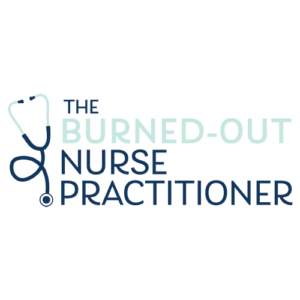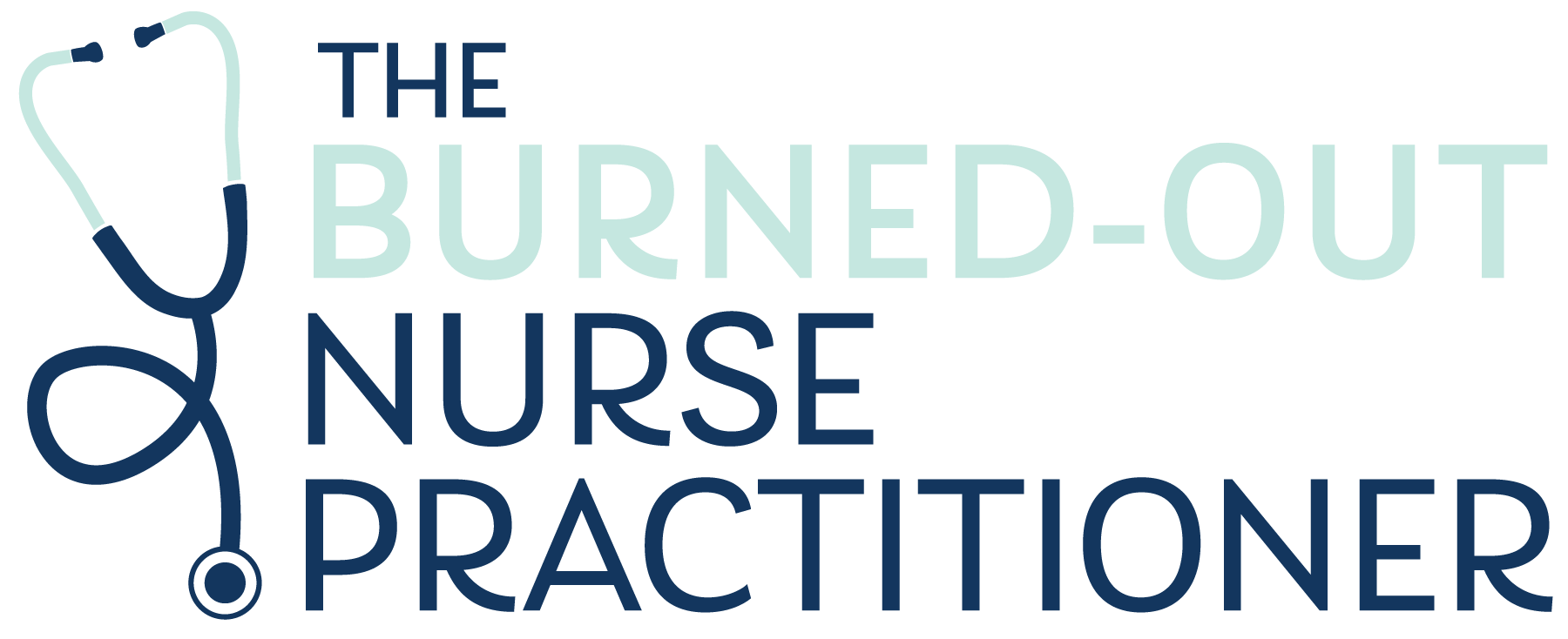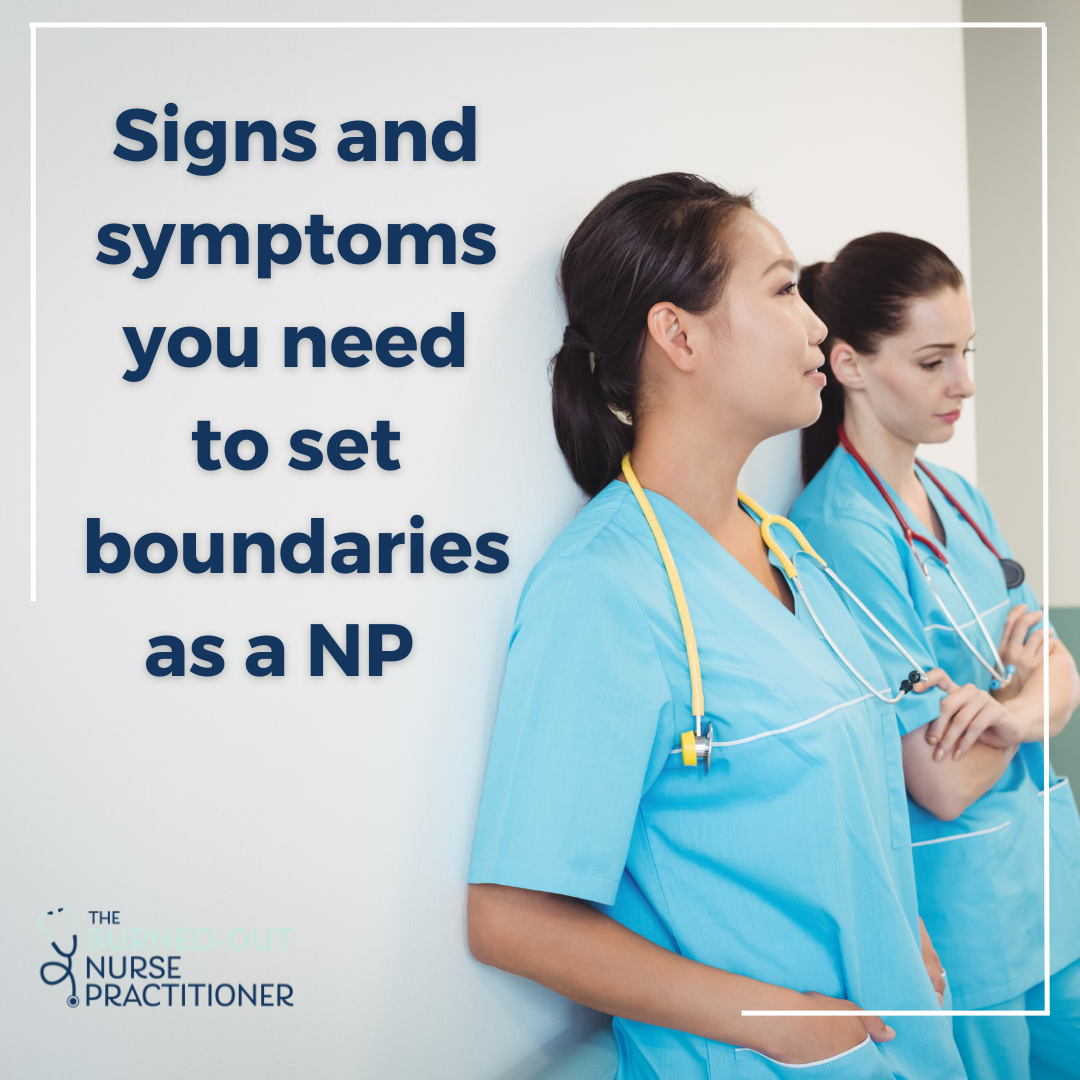Do you need to set boundaries as a nurse practitioner?
Maybe you’re not even aware that you have a lack of boundaries yet it is creating a negative impact in your personal and professional life.
If a nurse practitioner has a lack of healthy boundaries, it is very likely they are struggling with (or nearing) nurse practitioner burnout.
A boundary is defined as a limit or rule with clear expectations.
A boundary addresses assumptions and preconceived notions. Setting healthy boundaries helps to protect a nurse practitioner’s time, energy, and mental/physical/emotional health. When a person does not establish boundaries, they do not put their needs first.
Nurse practitioners constantly put other people’s needs first. We end up empty. Our cups are not filled. We are not able to pour our support to others.
If you experience a lack of boundaries with patients, bosses, colleagues, co-workers, or even in our personal relationships, you likely need to set boundaries as a nurse practitioner.
Lack of boundaries can create a lot of negative emotions and frustrations. If you do not set boundaries as a nurse practitioner, it can lead to nurse practitioner burnout.
That is why creating healthy/positive boundaries is so important!
Here are some signs and symptoms you need to set boundaries as a nurse practitioner.
- Nurse practitioner burnout caused by lack of boundaries
- Hear comments like “I can always count on you”
- Experience codependency- people always ask you for things/rely on you
- People expect help and support from you
- Feel like you have little self-worth, feel like pushover
- Feeling disrespected for sharing own values or ideas
- Risk own happiness for others happiness
- Struggle with being a people pleaser
- Want people to like you/don’t want to disappoint people
- You feel taken advantage of
- You are making excuses, trying to validate your decisions to help
- Feel stretched too thin with daily tasks
- Feel guilty for saying no
- Don’t like confrontation- easier to say yes
- Give more to a relationship than other person
- Become resentful when helping others
- Say yes then despise doing the work
What signs and symptoms of unhealthy boundaries would you add to the list? Have you experienced any other emotions or thoughts about poor boundaries?
Examples you need to set boundaries as a nurse practitioner:
- Always picking up an extra shift or task when asked by your clinic manager/boss.
- Doing extra favors/work for your patient that you wouldn’t normally do for other patients.
- Allowing a patient to schedule 10 minutes after the last acceptable appointment.
- Enabling your teenager by giving them extra money instead of making them get a job.
- Helping out your friend with a last minute favor (again), even though you already had plans.
I used to struggle with a lack of boundaries.
It negatively impacted my life and contributed to my burnout.
If my nursing supervisor called, begging me to pick up a shift because the floor was short staffed I said “yes.” Once I actually got to work, I despised every minute of it. If an acquaintance (not a close friend) asked for something, I would drop everything and do that. I would sacrifice time with my family or time for myself to put others’ needs first.
The signs and symptoms I experienced around lack of boundaries included: feeling resentful for saying yes, forgoing my own needs/self-care, constantly working about making other people happy (people-pleaser through and through), and noticing people would come to me for something because they knew I would say yes.
Needless to say, these unhealthy boundaries and lack of prioritizing my own needs caused my burnout.
If it feels hard or scary to create healthy boundaries, I want you to remember this: Setting boundaries is not about saying “no” to everything. It is about protecting your time and energy to say “yes” to the things that you want.
For example, I would rather take care of my own physical, mental, and emotional health so that I can show up for my children instead of showing up for an extra shift at work. I said “no” to the the extra shift so that I could say “yes” to something that was more important to me. Utilizing this method can help nurse practitioners ensure they are filling their cup instead of constantly running on empty.
I now feel like I have a better handle on setting healthy boundaries. I feel like I have freedom to help others in the way that is comfortable to me. I am able to put my needs first and fill my cup. I then have more mental, physical, and emotional energy to help others. I am able to set boundaries as a nurse practitioner.
Have you struggled as a nurse practitioner with any of these signs and symptoms of lack of boundaries? Do you feel as though you need to set some healthy boundaries to better protect your time and energy? Would you contribute your nurse practitioner burnout to having a lack of healthy boundaries?
Through my work as The Burned-out Nurse Practitioner , I saw a recurring theme in nurse practitioners struggling with burnout. Many APRNs had unhealthy boundaries with their coworkers, bosses, colleagues, people in their personal lives, even themselves. I teach how to set boundaries as a nurse practitioner to better protect time and energy. APRNs can improve their work-life balance and resolve the nurse practitioner burnout.
Solution to set boundaries as a nurse practitioner
I created a Setting Boundaries training offered through Burnout Resolution for Nurse Practitioners (an online course where nurse practitioners will learn the framework and mindset shifts to empower you create a better work-life balance and resolve the burnout).
The Setting Boundaries training discusses:
- Why nurse practitioners are prone to unhealthy boundaries
- The importance of setting healthy boundaries
- And will teach you how to establish and adhere to healthy boundaries utilizing The 5 A’s of Setting Boundaries
- Accept need to set healthy boundaries
- Awareness of impact with unhealthy boundaries
- Acknowledge what boundaries need to set
- Announce new boundary
- Adhere to new boundary
It does take work to set boundaries as a nurse practitioner. But once these boundaries are established, a nurse practitioner can better protect their time.
Learn more about creating healthy boundaries, creating a better work-life balance, and resolving burnout through Burnout Resolution for Nurse Practitioners.

For time management and charting tips, check out The Nurse Practitioner Charting School– The one stop for all documentation resources created specifically for nurse practitioners. Learn more at www.npchartingschool.com

**Full disclosure, this blog post may include affiliate links. I do receive a commission if any of the affiliate programs/services/supplies are purchased. This is at no extra cost to you but does allow me to continue to provide content as The Burned-out Nurse Practitioner! Thank you!




